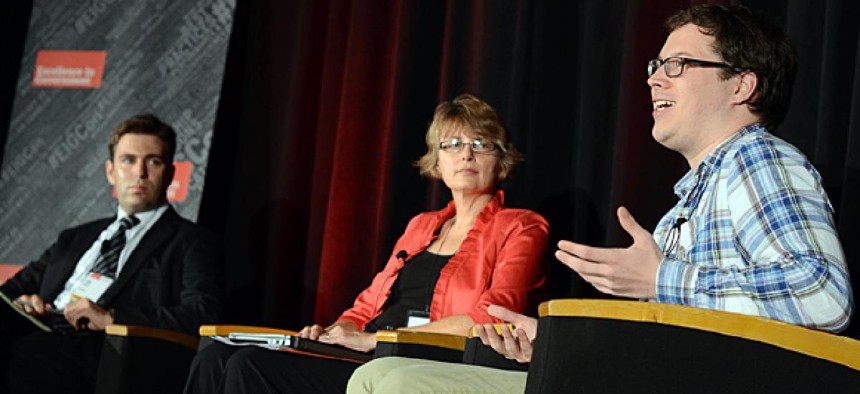Feds embrace ‘nerds of the Internet’

Nextgov reporter Joseph Marks, Kari Craun, director if USGS' National Geospatial Technology Center and Dominic McDevitt-Parks, resident Wikipedian for the National Archives Caitlin Fairchild/Nextgov.com
From mapping to archives, agencies look to crowdsourcing.
Federal agencies are turning to the public to fill information gaps and promote their data, crowdsourcing experts said at a panel Thursday.
“People who build information are starting to realize the way the Web works now -- it goes beyond their own little website,” said Dominic McDevitt-Parks, resident Wikipedian for the National Archives and Records Administration. The discussion was part of Government Executive Media Group’s Excellence in Government conference.
McDevitt-Parks, who promotes Archives’ data to Wikipedia editors, said more people are accessing his agency’s information through Wikipedia than its own website. Archives.gov received 17 million hits in 2011, while he estimated all the Wikipedia pages hosting Archives data tallied about 1 billion.
The answer, therefore, is to embrace the technology, he said: “If we want to reach the public, then we want to go to Wikipedia.”
The U.S. Geological Survey also is engaging the public for mapping information, testing a pilot program in Denver in which the public provides data such as where post offices and schools are located.
Kari Craun, director of USGS’ National Geospatial Technology Center, said she still has reservations about the long-term viability of the program.
“Over time, we are going to see if this is a sustainable model,” she said. “We’re not sure yet.”
Both speakers vouched for the quality of the product that results from crowdsourcing, stating the criticisms of the publicly collected information are overblown.
“I think we have to change our mindsets,” Craun said.
McDevitt-Parks concurred. “Wikipedia is where the nerds of the Internet go,” he said. “There are actually a lot of people on Wikipedia who know more about the things you are doing than maybe you do.”
NEXT STORY: NASA helps hatch robots for drilling oil






